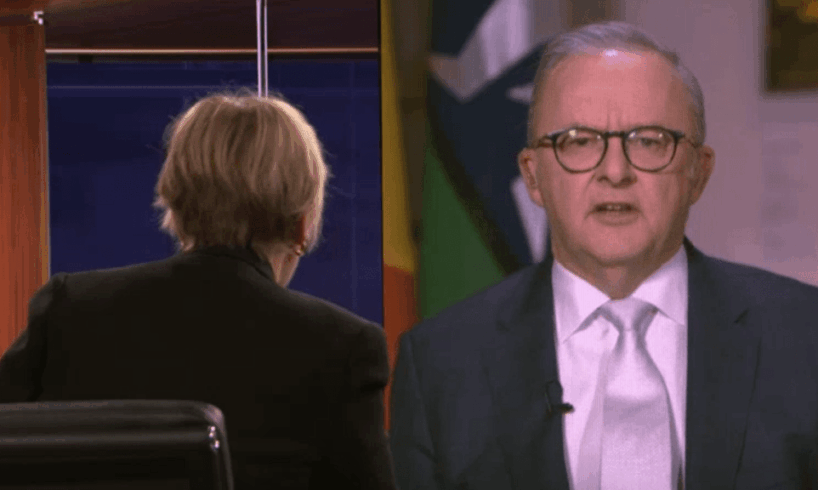
It was embarrassing to watch the prime minister struggle to articulate his position on the recognition of a Palestinian state on 7.30 last night, but his foot-dragging on the issue is unlikely to directly harm him politically.
As a foreign policy matter — and an intractable one at that — whether and when Australia recognises Palestine won’t shift any votes or preoccupy too many voters. And with the Greens licking their wounds, and the Coalition so locked into supporting the extermination of Palestinians that even its MPs are fretting they look a little out of touch, there’s no-one to effectively exploit whatever community sentiment there might be that the government is failing to react to Israel’s genocide.
Not that Anthony Albanese sounded comfortable as Sarah Ferguson tried to pierce his fog of banalities — such as “we will give consideration to all of the factors which are there” — and force him to clarify what exactly needed to change before he’d implement his party’s policy of recognition.
Ferguson also had him squirming on the role Donald Trump will play in this, after the US president once again sought to interfere in the affairs of other countries by threatening that Canada would get no trade deal if it recognised Palestine.
Albanese tried to walk a fine line, offering his usual response that Australia would make its own decisions, but also that “clearly the US has a role to play here … there is an opportunity for the US to play a leadership role here, for President Trump to play a role that, of course, will be a matter for them. But the US has long engaged in the Middle East, and clearly what needs to occur in order to have the two-state solution realised is an overall plan for the entire region. And the United States has a role to play in that.”
Related Article Block Placeholder
Article ID: 1215509
Beyond those banal observations is a troubling logic: the government is still of the view that recognition of a Palestinian state must be part of a broader process.
But as we know, that position is no longer viable: the Netanyahu regime has no interest in a genuine peace process or a two-state solution. Peace puts Netanyahu in huge political danger (leaving aside the small matter of his corruption trial), and most of his government is made up of racists who want to wipe Palestinians off the map. Whether Trump is interested in peace isn’t clear, but he lacks the cognitive capacity or temperament to focus on that issue — or anything else — for more than five minutes.
That’s why French President Emmanuel Macron broke ranks and declared there was no alternative to recognition now. But Albanese has not only made Palestinian recognition beholden to a process Netanyahu will never participate in, but he’s also made Trump’s participation in that process a requirement as well.
If it’s not a US veto on Australian recognition of Palestine, it’ll do till one arrives. Albanese will be very keen not to displease Trump. There’s the ongoing issue of tariffs — would the US president double tariffs on Australian imports if we recognised Palestine? But there’s also AUKUS, currently under review by the US administration.
If Trump ditched AUKUS, it would be a colossal humiliation for Albanese, who signed Labor up to the idiotic idea five minutes after then PM Scott Morrison announced it. It would leave Australia in a deep hole in terms of its submarine capability, given we have wasted several years on the fantasy of submarines that were never going to arrive. Worse, it would confirm the critique of former prime ministers, including Paul Keating and Malcolm Turnbull, and enable the Coalition to claim Labor ruined its perfectly good submarine deal.
So when Albanese says that Australia will make its own decisions, that comes with the big caveat that our decisions are unlikely to be ones that upset Trump, because AUKUS has given him huge leverage over us. It’s of no moment to America if it ditches AUKUS — it will have more submarines to aim at China — but of huge concern to a Labor Party that, in its current form, has essentially sold our sovereignty to a country that is increasingly unstable, authoritarian and unreliable.





